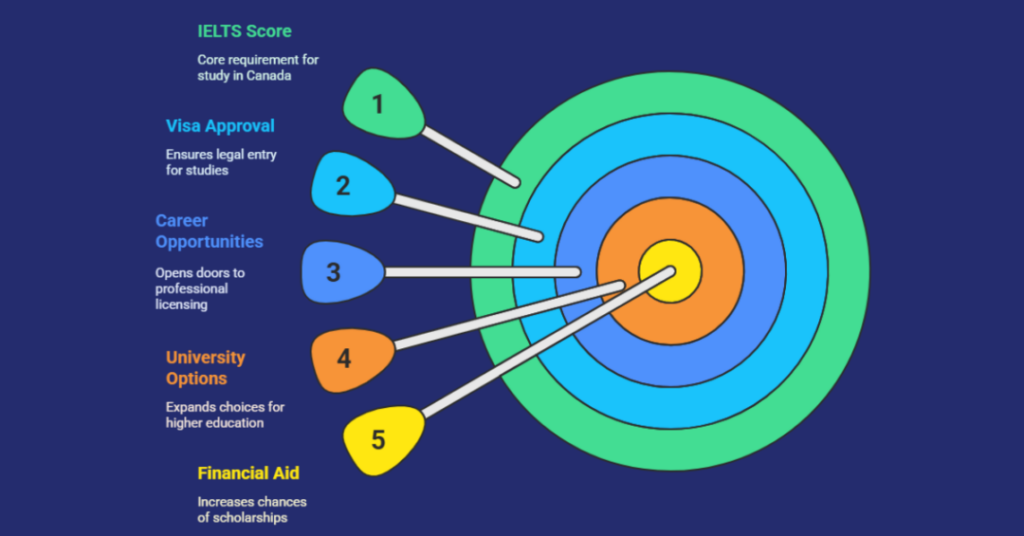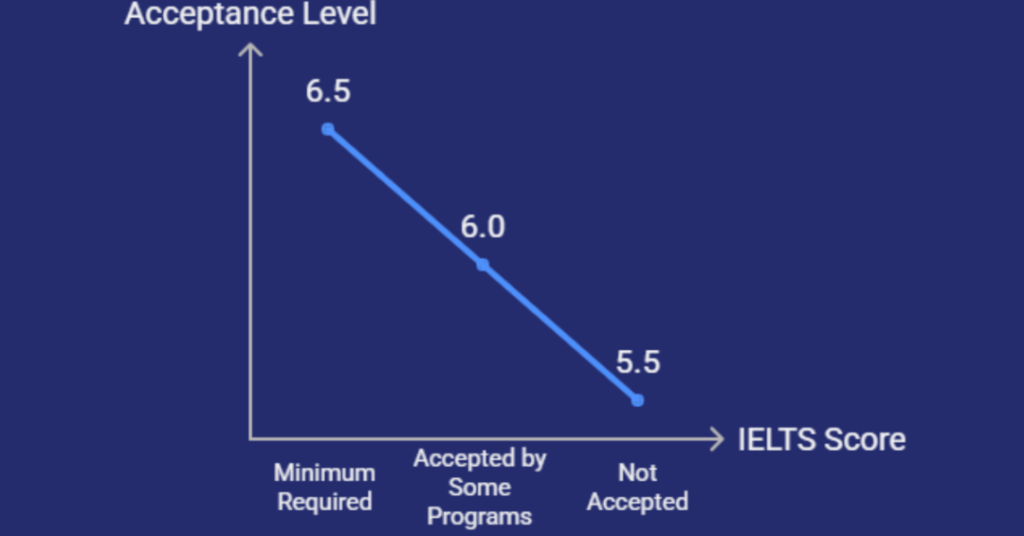22 June 2025
6 minutes read
What Is The Minimum IELTS Score For Canada Universities?

Key Takeaways
- Know the exact IELTS score for Canada universities early to avoid wasting months on the wrong prep.
- Always aim for an overall IELTS score of 6.5 with no section below 6.0 for better acceptance chances.
- Use internal language programs at select universities if meeting minimum IELTS requirements feels out of reach.
You don’t book a flight without knowing your visa status — so why are you preparing for the IELTS test without knowing the minimum IELTS score for Canada? It’s wild how many students hustle for months, memorize speaking answers like robots, and still get blindsided at the last minute by the IELTS requirement. Brutal? Yeah. Preventable? Absolutely.
Here’s the shortcut you actually need: to study in Canada, you need an overall IELTS score of 6.5, with no band lower than 6.0. Anything less and top universities in Canada will politely ignore your application. Know this early, aim for it, and stop wasting time on the wrong prep.
What Is The Importance Of IELTS Score For Canada Universities?
You know what’s fun? Spending months researching how to study abroad, finding the perfect Canadian university, dreaming of that new life… just to get rejected because your IELTS band score didn’t meet the score requirement. Sounds harsh, right? Welcome to the real world of Canadian admissions. It’s not about vibes — it’s about that IELTS exam number. Whether you like it or not, your overall score can literally decide your future. Brutal honesty, served hot.

Now, let’s talk about why this IELTS academic score matters way more than you think — and no, this isn’t the generic “because universities require IELTS” speech.
1. Visa Officers Don’t Care About Your Dreams — They Care About Numbers
Before you even think about classes, you need that study permit, and guess what? Immigration looks at your IELTS score requirements like a hawk. Even if the university accepts a score of 6.0, visa officers might expect more for certain programs. Low band scores = high rejection risk. They want proof you can survive in an English-speaking country, not just pass lectures.
2. Your Future Job Might Depend On Your IELTS Score
Think you’re done with IELTS once you land in Canada? Nope. Some professional licensing bodies in Canada require IELTS for registration. Didn’t hit that minimum IELTS band now? You might hit a wall later in your career. The score required today saves you from regret tomorrow.
3. Low IELTS Scores Limit Your Choice Of Universities
Top schools don’t play games. If your overall score is sitting at a score of 5.5, forget about applying to top-tier universities. Many competitive programs have strict IELTS score requirements, often asking for a minimum band of 6.5 or higher. Don’t let a weak IELTS exam score shrink your options before you even begin.
4. Scholarships? Yeah, They Also Look At Your Band Score
Want funding to study abroad? Most Canadian scholarships favor students with a solid IELTS academic overall score. If you barely scraped through with a score of 6.0, don’t expect free tuition. Better IELTS band scores increase your chances of financial aid. More money saved, fewer loans taken.
5. Universities Don’t Trust IELTS General
This one’s a secret many miss: IELTS general might work for immigration, but universities expect IELTS academic for admission. Submitting the wrong version? Automatic rejection. Knowing the required IELTS score and which IELTS exam version to take can save your entire application process from going down the drain.
What Is The Minimum IELTS Score For Canadian Universities?
Most Canadian universities expect an overall score of 6.5 in IELTS academic, with no individual band score below 6.0. Some programs might accept a score of 6.0, but anything below that — like a score of 5.5 — usually won’t cut it unless you’re applying for pathway or foundation programs.

Always check the required IELTS score for your specific course before you apply.
10 Top Universities Without IELTS Requirement To Study In Canada
You don’t need a band score of 6.0 to be successful, but apparently, you do to get into most Canada universities — unless you know the backdoor. Crazy, right? While everyone’s stressing over IELTS band requirements, memorizing speaking cue cards, and sweating over minimum IELTS scores for Canadian universities, here’s a truth bomb: Some top Canadian universities will let you in without taking the IELTS — but only if you’re smart enough to know the alternatives. That’s what we’re here for.
If you’re planning to study in Canada, eyeing that Canada student visa, or thinking long-term about permanent residency in Canada, here’s your cheat sheet. Skip the IELTS academic test — go for these smarter alternatives.
| University | Average Tuition Fees (CAD/Year) | Average Starting Salary (CAD/Year) | Alternative to IELTS |
|---|---|---|---|
| University of Winnipeg | 13,000 – 17,000 | 48,000 – 52,000 | English Language Program (ELP) |
| Brock University | 14,000 – 19,000 | 50,000 – 55,000 | Intensive English Language Program (IELP) |
| Memorial University of Newfoundland | 11,000 – 15,000 | 46,000 – 50,000 | Intensive English Program (IEP) |
| Concordia University | 15,000 – 20,000 | 52,000 – 58,000 | Completion of Concordia’s English for Academic Purposes (EAP) program |
| Carleton University | 16,000 – 22,000 | 52,000 – 60,000 | English Language Proficiency Program |
| Cambrian College | 9,500 – 14,000 | 42,000 – 48,000 | English for Academic Purposes (EAP) |
| Seneca College | 13,000 – 18,000 | 45,000 – 51,000 | Completion of Seneca’s English Language Institute (ELI) |
| Okanagan College | 12,000 – 16,000 | 44,000 – 50,000 | English for Academic Purposes (EAP) |
| University of Regina | 14,000 – 20,000 | 48,000 – 54,000 | ESL (English as a Second Language) Program |
| University of Saskatchewan | 15,000 – 21,000 | 50,000 – 56,000 | Completion of U-Prep ESL Program |
What Does Top Canadian Universities Require?
They don’t care about your dreams unless you match their IELTS band requirements, academic expectations, and a bunch of other sneaky filters. Everyone’s busy chasing a score of 6.0 overall without realizing what’s actually required to study in Canada. You’re either prepared… or you’re politely shown the door.
Let’s break down the real things you need to know if you’re chasing that Canada student visa, aiming for permanent residency in Canada, and wanting a seat in those top Canadian universities. This isn’t surface-level stuff — this is what separates accepted from rejected.
1. A Minimum IELTS Score Isn’t Enough — You Need Section Balance
Most canadian universities accept an overall IELTS score of 6.5, but here’s the catch: even if you meet that, they’ll check your per-section prerequisites. If you have 5.5 in each band for one section? That’s a rejection email waiting to happen. IELTS requirements for Canadian universities include hitting both the overall band score and individual sections. You don’t just need a good score — you need a balanced one.
2. Some Programs Demand Higher IELTS Band Requirements Than Others
Forget generic “university” advice. What matters is your university and program. While some canadian universities accept a minimum IELTS score of 6.0, competitive courses like engineering or law may expect a score of 6.5 or higher, especially for writing and speaking. Your IELTS requirement for your desired program might shock you. Always find out the minimum IELTS per program, not just by institution.
3. Proof Of Funds Is Just As Important As IELTS Scores
Want that study visa or canadian student visa? Great — but they don’t hand it over just because you’ve hit the minimum IELTS score required. You’ll need to prove you can fund your education and living expenses in Canada. No matter how good your IELTS score is, no funds = no study permit = no school.
4. Academic Requirements Differ From IELTS Exam Scores
A good score in IELTS doesn’t automatically make you eligible. Each university checks your academic transcripts alongside your IELTS exam scores. You might meet the IELTS score requirements for top universities but still get rejected because your grades don’t meet the requirements to enter a top program. IELTS is one filter — academics is the other.
5. Language Proficiency Isn’t Just About IELTS — Some Schools Accept Alternatives
Yes, IELTS is one major requirement, but some universities according to the Times or internal policies may accept TOEFL or completion of internal language proficiency requirements programs. But if you’re taking the IELTS, make sure you’re hitting the minimum IELTS band score requirements, especially if you’re aiming for migrating to Canada for work or citizenship Canada later. Don’t just focus on the minimum score — hit the overall IELTS score of 6.5 or more if you want flexibility later.
Conclusion
Canada doesn’t hand out study visas or Canadian student visas just because you “want to study” there. The minimum IELTS band score exists for a reason, and if you don’t meet the minimum score or the overall IELTS score required, you’re basically playing football barefoot — painful and unnecessary.
If you’re planning to study in Canada or aiming for permanent residency in Canada later, finding out the minimum IELTS you need before applying isn’t optional — it’s strategy. Whether you hit that IELTS score of 6.0 overall or aim higher like 6.5 on the IELTS academic, just remember: this isn’t about impressing universities; it’s about proving you can handle life, lectures, and everything in between.
To get into a top Canadian university, you need more than just good grades—you need a game plan. Ambitio’s AI-powered platform and expert consultants guide you through every step, from choosing the right university to securing study permits and work opportunities. No guesswork, no wasted time—just a clear, structured path to studying in Canada. If you’re ready to make studying in Canada a reality, Ambitio is your best bet.
FAQs
What is the minimum overall IELTS score required to study at most Canadian universities?
Generally, a minimum overall IELTS score of 6.5 is required, with no band less than 6.0 in Listening, Reading, Writing, and Speaking
Do IELTS score requirements vary by university and program?
Yes, IELTS requirements differ depending on the university and the program of study (undergraduate, postgraduate, or foundation courses)
Are there universities in Canada that require higher IELTS scores?
Yes, some top universities like the University of Waterloo require an overall IELTS score of 7.0, while many others require 6.5 overall
Is there a minimum IELTS score for each section?
Most universities require a minimum of 6.0 in each of the four sections: Listening, Reading, Writing, and Speaking
Can I apply to Canadian universities with an IELTS score below 6.5?
Some colleges and diploma programs may accept lower scores, such as 5.5 or 6.0 overall, but this varies by institution and program

You can study at top universities worldwide!
Get expert tips and tricks to get into top universities with a free expert session.
Book Your Free 30-Minute Session Now! Book a call now




























